- 翻译公司资讯
-
曾经的“娘娘腔”们翻身成了“精猪宝贝”,你怎么看?
发布时间:2018-09-21 09:35 点击:
心理学家、作家、哲学家、艺术家都说过:优秀的人,都是雌雄同体。
于是乎,近年来中性风大行其道。女人的腔调、打扮越来越爷们儿,而男人也是越来越女性化,且衍生出一系列富含褒奖意义的新词、热词:什么“花美男”、“小鲜肉”。
最近,又有一个形容漂亮男人的网络新词成为热议话题:精猪男。就是指那些在日常生活中喜欢护肤美容、化妆打扮的年轻男性。他们对外表的呵护的程度丝毫不亚于女性,什么洁面、保湿等基本护肤步骤自不在话下,擦粉底、画眉毛、甚至涂口红也是理所当然。
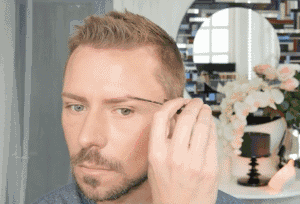
前阵子,杭州一位“精猪男”就成为网上热议的话题。据《都市快报》报道,这位93生的杭州小伙徐涛既非明星也非网红,而是再普通不过上班族一枚。不过他的精致生活奢侈得让身为中年少女的小编姐姐咋舌:兰蔻小黑瓶、SK-II神仙水、阿玛尼粉底、海蓝之谜精华露……一年花在脸上的开销超3万。而他清早30分钟的护肤步骤:洗脸、爽肤、精华、眼霜、面霜、防晒、底妆、画眉……瞬间让每天顶着一张隔夜面孔踩着点赶来上班小编觉得自己就是中年老阿姨……
最近,港媒《南华早报》也关注到了“精猪男”这一群体,并发文对这一现象进行了报道分析。
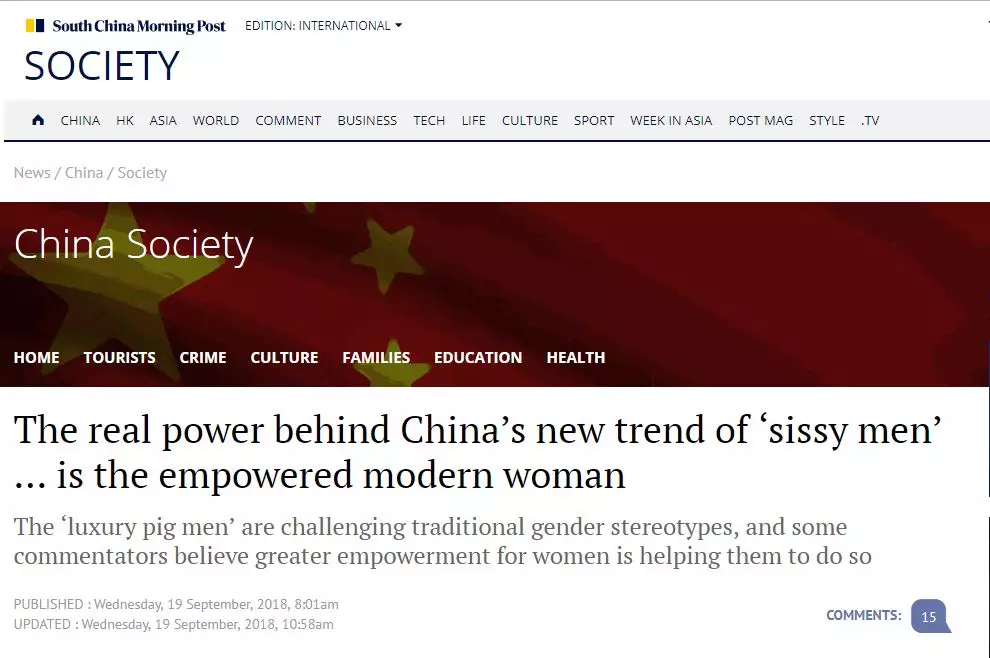
(Via SCMP)
These skincare-savvy jingzhunan, as they are known in Chinese, have gathered widespread attention for their intricate and time-consuming beauty regimes in a stark contrast to the traditional macho ideal.
(Via The real power behind China’s new trend of ‘sissy men’ ... is the empowered modern woman)
这些精于护肤的精猪男(luxury pig men)因他们繁复而耗时的美容步骤受到了广泛的关注,与传统的男性形象形成鲜明对比。
文章随即提出观点:
But the trend may be driven not just by fashion but by greater female empowerment and the increased attention to what women want.
这种趋势不仅仅是由时尚引领的,还是因为女性被赋予了更强大的权力以及更关注女性的需求导致的。
“小鲜肉”和“精猪男”的出现是为了取悦越发强悍的中国女性?
想想也是,如今相当一部分中国女性早已经济独立不再指望被靠不住的男人养,而是主张自己挣钱养男人了!
《南华早报》援引了几位专家的观点:
“They embody a new trend of male beauty that appeals more and more to female millennials,” said Matthieu Rochette-Schneider, China general manager of French brand consultancy Centdegres. “It is becoming the new beauty standard for Chinese men.”
“他们体现了一种男性魅力的新潮流,来吸引更多女性千禧一代,”法国品牌咨询公司Centdegres的中国区总经理Matthieu Rochette-Schneider对《南华早报》说,“这已经成为中国男性的新美学标准。”
Professor Geng Song, who researches Chinese masculinity at the University of Hong Kong, agreed.
As women have gradually improved their social and economic standing, “their tastes and desires in terms of masculinity have become increasingly important”, he said.
香港大学男性研究教授宋耕也同意这种观点。当女性社会和经济地位逐渐提升后,“女性对男子气概的品味和需求就变得尤为重要。”
那新时代女性对男性的品味是什么样的呢?从“鲜肉”“美男”霸屏各档电视节目的现象便可一目了然。
Programmes starring “little fresh meat” – with their huge female fan base – are more likely to get commissioned by TV stations, according to Song, especially since Chinese television drama audiences are dominated by women.
基于他们强大的女性粉丝后援团,“小鲜肉”们C位出镜各档节目,更有可能获得电视台的通告,因为中国电视剧观众主要是女性。
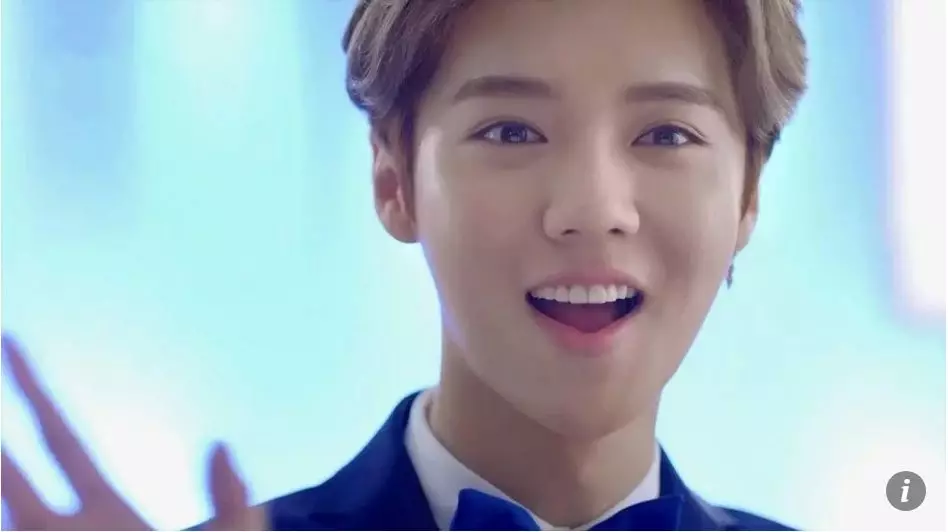
(Via SCMP)
As a knock-on effect, men are feeling more pressure to take care over their appearance and use it as a form of social capital – as women have traditionally done for centuries.
作为连锁反应,男性越发感受到需要提升他们颜值的压力,以此来作为社会资本,正如千百年来女性所实践的一样。
“It’s not that all women in China particularly like this type of young, handsome, effeminate man – it’s that men have begun to realise that appearance could be important for them in terms of career success,” Song said.
“并非所有中国女性都特别喜欢这类男性——年轻、帅气、纤弱——只是男性开始意识到外表对他们的事业成功可以至关重要,”宋耕说。
In this way, China is slowly beginning to mirror South Korea in its oemo jisang juui – or “looks are supreme” – culture of workplace advancement.
如此,中国慢慢地在模仿韩国的“颜值即正义”的职场进阶文化。
澳大利亚新闻网站Mirage News前不久也关注到了这一现象。
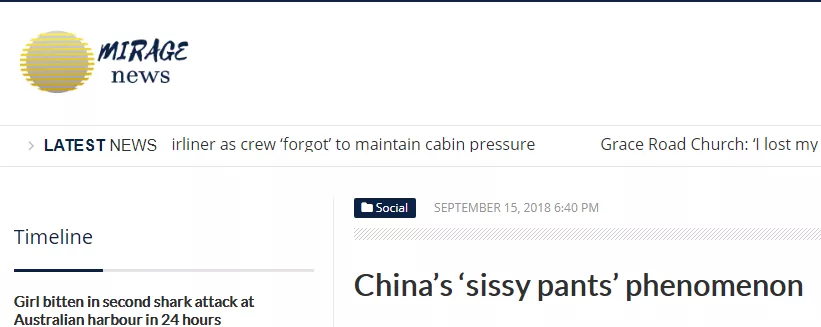
(Via miragenews.com)
Applying foundation, nose contouring and filling in eyebrows are standard practice for many women getting ready to head out.
But for many men in China and in other parts of Asia, using cosmetics is part of their routine too.
(Via China’s ‘sissy pants’ phenomenon)
上粉底、打鼻部阴影、画眉毛,是许多女性出门前的标准程序。
但是对许多中国男性和其他亚洲国家的男性来说,化妆也是他们的常规程序。
文中提到一位22岁的张姓上海男教师每天要带妆出门,且他月薪的三分之一都花费在了服装和化妆品上。他觉得化妆可以让他更自信,而且觉得男人也该好好拾掇自己的外表。
Mr Zhang is part of a growing trend in China, where men are displaying a softer form of masculinity, sparked by the rise of effeminate male celebrities in Chinese media and popular culture.
张只是中国日益壮大的“精猪男”群体的一份子。中国男性正在展示男性更阴柔的一面,这一趋势是由中国媒体和流行文化推崇的“鲜肉”男星们引领的。
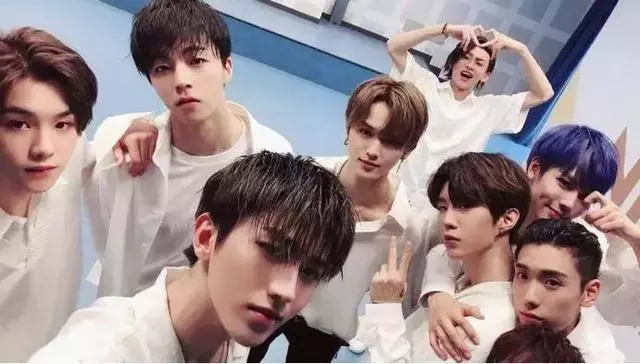
Statistics from research firm Euromonitor show the market for male grooming products is rapidly expanding in China, with a 44 percent sales increase of male grooming products from 2011 to 2016.
来自咨询公司欧睿(Euromonitor)的数据显示男性美容产品在中国市场快速增长,2011年至2016年间,男性美容产品的销售增长了44%。
Julia Illera, research consultant at Euromonitor International, anticipated global sales of male beauty products would continue to rise over the next five years, particularly in the Asia Pacific market.
欧睿国际(Euromonitor International)的研究顾问Julia Illera预计全球男性美容产品的销售将在未来5年继续增长,特别是亚太市场。
看来,男性越来越注重外表、越来越“娘”,也非中国特色。且此类文化也是从日韩逐渐流行到中国的。男性注重外表无可厚非,取悦自己也愉悦异性,何乐而不为呢?
不过,相比外表的阴柔或刚毅,小编更在意的是中国年轻一代的内心状态。那些心理学家、哲学家、作家等先贤提出的“雌雄同体”绝不是指外表上的不男不女,而是指内心的平衡和从异性角度感知和思考的能力。
相比男性,中国新一代女性的确在意识上更男性化,更接近“雌雄同体”的状态,那中国的年轻男性呢?
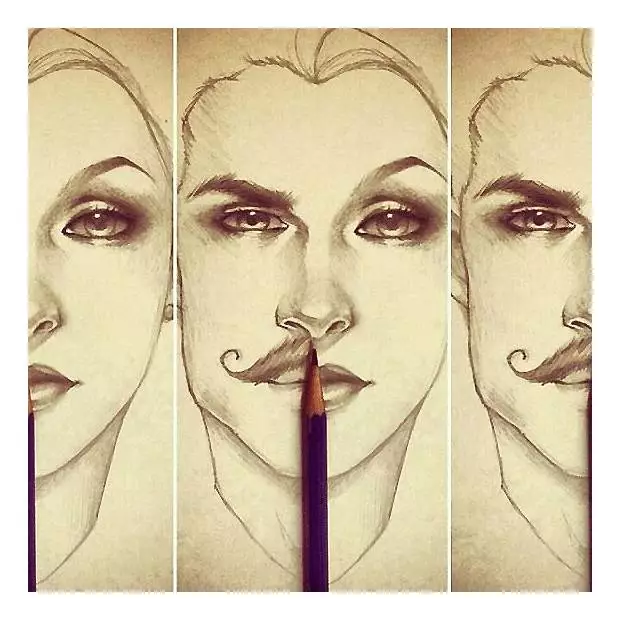
你对这一现象怎么看?
欢迎留言分享吐槽!

Unitrans世联翻译公司在您身边,离您近的翻译公司,心贴心的专业服务,专业的全球语言翻译与信息解决方案供应商,专业翻译机构品牌。无论在本地,国内还是海外,我们的专业、星级体贴服务,为您的事业加速!世联翻译公司在北京、上海、深圳等国际交往城市设有翻译基地,业务覆盖全国城市。每天有近百万字节的信息和贸易通过世联走向全球!积累了大量政商用户数据,翻译人才库数据,多语种语料库大数据。世联品牌和服务品质已得到政务防务和国际组织、跨国公司和大中型企业等近万用户的认可。 专业翻译公司,北京翻译公司,上海翻译公司,英文翻译,日文翻译,韩语翻译,翻译公司排行榜,翻译公司收费价格表,翻译公司收费标准,翻译公司北京,翻译公司上海。



